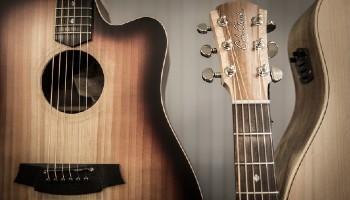Professor Chris Gibson & Dr Andrew Warren, University of Wollongong

ACCESS Seminar: The Guitar: Tracing the Grain Back to the Tree
-
-
-
Online
Abstract
In the past decade the guitar industry has faced scandals and heightened scrutiny linked to illegal logging and failure to verify sources of raw material in line with growing international environmental regulation. Shortages of key timbers—required by the industry because of the acoustic and technical properties of wood—have triggered reconfigurations in supply chains and designs, and spurred a sense of existential crisis among guitar manufacturers. Agreeing to research and write about guitar making and timber, the industry and its environmental problems, we visited guitar factories, asking questions of procurement, stewardship and material skill and care among workers. Then, we wondered: what if we could follow the guitar even further, to its forest origins? From factories we could go to the sawmills that supply them. And from there, what if we could witness the trees from which guitars are made? Humanities and social sciences researchers have questioned the credibility of “detached” academic analysis, advocating instead for reflexive, “embodied” perspectives that describe relationships and place authors in dialogue with research subjects. Environmental historian Thom van Dooren proposed bearing witness to threatened places, plants, and animals, as a distinctive ethical stance fueling “new forms of curiosity and understanding, new relationships and so new accountabilities.” We committed to traveling as widely as small grants and work schedules would allow, documenting the lived experiences of factory workers, sawmillers, foresters, and Indigenous custodians, and the shifting forces that shape working lives. We hoped that encountering firsthand the people, places, forests, and trees behind guitars would enable us to write as “an act of response, an effort to craft better worlds with others.” And so, inspired by geographer Ian Cook’s research methodology to “follow” everyday things, our goal crystalized: to start with the finished guitar and trace it, “in rewind,” to its origin places, people, and plants. Six years later, in a new book we have brought together our travels and the places and characters encountered along the way. The book is laid out as a journey¬—from guitar to factory, factory to sawmill, sawmill to forests, and eventually to the trees—and travels historically and geographically, tracing the people, ideas, and materials of guitar-making. At each stage, we ask questions about work, skill, and environmental burden. Imperial and corporate power form backdrops against which we meet solo operators persisting precariously at the margins of industry and society. We learn about timeless skills, cooperation, and devotion to a craft, juxtaposed with ignominious cases of exploitation and loss. Above all, there is a lurking sense of uncertainty about a future unsettled by scarcity and impending climatic tumult. All is not calm in the worlds of guitar-making, timber, and forests. There is apprehension and anxiety, as the ethereal realm of music comes face to face with the larger forces of colonialism, capitalism, and planetary-scale environmental change.
Biography
Chris Gibson is Professor of Human Geography at the University of Wollongong, as well as a practicing musician—interests previously combined in books about geographies of music (Sound Tracks, Routledge 2003), creative industries (Creativity in Peripheral Places: Redefining the Creative Industries, Routledge 2014) and music festivals (Music Festivals and Regional Development, Routledge 2012; Outback Elvis, NewSouth 2017). Andrew Warren is Senior Lecturer and ARC DECRA Fellow at the University of Wollongong, and co-author (with Chris) of Surfing Places, Surfboard-Makers: Craft, Creativity and Cultural Heritage in Hawai‘i, California and Australia (University of Hawai‘i Press, 2014). Their latest book together, The Guitar: Tracing the Grain Back to the Tree, will be published by the University of Chicago Press in 2021 (https://press.uchicago.edu/ucp/books/book/chicago/G/bo81816665.html). In this seminar, they will introduce the book and chart its themes, on the eve of its global release.


